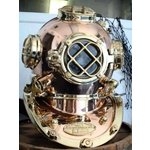Clear Airway vs Obs Airway question
Clear Airway vs Obs Airway question
My AHI's have been climbing over the past few weeks. I was averaging AHI about 2-3 each night. Over the past 2 weeks I have climbed to 5-7 AHI. On Sleepyhead the breakdown seems to be more CA's than OA's. Night before last my OA was less than 1, but CA's put me up to AHI 5.6. I'm using an Opus360, without a chinstrap, and getting some mouth leaks, and dry mouth, but this is not a new issue. I'm wondering if the CA's are a pressure setting issue since I'm reasonably high pressure. (BIPAP at 17 and 11).. Anybody have thoughts?
Re: Clear Airway vs Obs Airway question
Hi emt!emt_271 wrote:My AHI's have been climbing over the past few weeks. I was averaging AHI about 2-3 each night. Over the past 2 weeks I have climbed to 5-7 AHI. On Sleepyhead the breakdown seems to be more CA's than OA's. Night before last my OA was less than 1, but CA's put me up to AHI 5.6. I'm using an Opus360, without a chinstrap, and getting some mouth leaks, and dry mouth, but this is not a new issue. I'm wondering if the CA's are a pressure setting issue since I'm reasonably high pressure. (BIPAP at 17 and 11).. Anybody have thoughts?
First of all “zoom in” on the events an look carefully at the flow waveforms (“zoom in” with SleepyHead amounts to “drag across” the area of interest – the top waveform is always a map of the whole night so dragging across it resets to see the whole view – or can be used to look at the next event). The flow waveform shows air incoming and outgoing – so estimate a zero crossing point and then “calculate” the area under the waveform (both directions should be the same). The area under the waveform represents the volume of air used.
Volume is very important here. If preceding the Clear Airway event you used a greater volume of air then it is likely to be a true hypocapnic central apnea – a time of recovery. Breathing effort causes arousals. If you have been breathing greater and greater amounts of air an arousal is likely. Since you have breathed all that air your body needs some time of not breathing to re-establish proper blood chemistry.
If you were not using a great amount of air preceding the event then most likely it was a natural pause. You may have been turning over. Any number of reasons.
Also look for Periodic Breathing events. They also indicate breathing instability.
If I see breathing instability events as mentioned above I:
Think about spending some daytime time with the machine. The key is to learn to breath quietly, gently, as we should when asleep. So time in the bed. It is also to establish the reflexes as normal. So time watching light TV, reading a book, listening to music. This was useful about this time last year as I was loosing weight – it was easier for me to breath so my reflexes needed to re-adjust.
Take some exercise. It is great for stress (which contributes greatly to breathing instability) and I do believe it exercises the breathing reflexes. I continue to try (been at it for five years now) for my 10,000 steps and do “85% of maximum heart rate” interval training since I am somewhat in shape. It does reflect in my night time breathing stability.
Look at my stress levels and see what I can do to reduce stress.
If the problem persists I reduce pressure if possible or use EERS[1] if not. I wish we had better therapies available[2].
Have a great day!
Todzo
[1]: Gilmartin G, McGeehan B, Vigneault K, Daly RW, Manento M, Weiss JW, Thomas RJ.
Treatment of positive airway pressure treatment-associated respiratory instability with enhanced expiratory rebreathing space (EERS).
Source: J Clin Sleep Med. 2010 Dec 15;6(6):529-38. Division of Pulmonary, Critical Care and Sleep Medicine, Beth Israel Deaconess Medical Center, Boston, MA, USA.
Link: http://www.ncbi.nlm.nih.gov/pubmed/21206741
[2]: Dynamic CO2 therapy in periodic breathing: a modeling study to determine optimal timing and dosage regimes
Yoseph Mebrate, Keith Willson, Charlotte H. Manisty, Resham Baruah, Jamil Mayet, Alun D. Hughes, Kim H. Parker and Darrel P. Francis
J Appl Physiol 107:696-706, 2009. First published 23 July 2009; doi: 10.1152/japplphysiol.90308.2008
Link: http://www.ncbi.nlm.nih.gov/pubmed/19628721
May any shills trolls sockpuppets or astroturfers at cpaptalk.com be like chaff before the wind!
- John from Brookston
- Posts: 248
- Joined: Sun Feb 24, 2013 10:07 pm
- Location: Brookston, Indiana
Re: Clear Airway vs Obs Airway question
This was very timely as i have been bothered the last 2 weeks by CA events BEFORE I go to sleep. I see now that when i first mask up that I take deep, full breaths, then just before I drop off, I stop breathing, which wakes me up fully. A few times of that and I'm done trying to sleep for an hour or 2.Todzo wrote: Volume is very important here. If preceding the Clear Airway event you used a greater volume of air then it is likely to be a true hypocapnic central apnea – a time of recovery. Breathing effort causes arousals. If you have been breathing greater and greater amounts of air an arousal is likely. Since you have breathed all that air your body needs some time of not breathing to re-establish proper blood chemistry.
If you were not using a great amount of air preceding the event then most likely it was a natural pause. You may have been turning over. Any number of reasons.
Also look for Periodic Breathing events. They also indicate breathing instability.
If I see breathing instability events as mentioned above I:
Think about spending some daytime time with the machine. The key is to learn to breath quietly, gently, as we should when asleep. So time in the bed. It is also to establish the reflexes as normal. So time watching light TV, reading a book, listening to music. This was useful about this time last year as I was loosing weight – it was easier for me to breath so my reflexes needed to re-adjust.
Take some exercise. It is great for stress (which contributes greatly to breathing instability) and I do believe it exercises the breathing reflexes. I continue to try (been at it for five years now) for my 10,000 steps and do “85% of maximum heart rate” interval training since I am somewhat in shape. It does reflect in my night time breathing stability.
Look at my stress levels and see what I can do to reduce stress.
If the problem persists I reduce pressure if possible or use EERS[1] if not. I wish we had better therapies available[2].
Have a great day!
Todzo
Since my heart attack 2 weeks ago I've been lucky to get 5 hours of sleep a night, and most of that is sleeping in a chair w/o the machine. when I'm sleeping well, the volume is about 1/2 what it is when i first go to bed.
I'll try sitting with the machine on during the day tomorrow..
_________________
| Mask: Swift™ FX Nasal Pillow CPAP Mask with Headgear |
| Additional Comments: BiPAP, running 19/13, no ramp. No meds, have a True-Blue nasal mask, too, and a Quattro for stuffy-nose nights. |
Big fat guy who's diabetic, on HRT, and now a heart attack survivor as well as having OSA (boy, I sure won the genetic rodeo, din't I?). Ham Radio operator and I have a black tomcat named "Bart" who looks like an old prize fighter.
Re: Clear Airway vs Obs Airway question
Thanks Todzo - reading you post, I think I can attribute this to a combination of starting a weight loss program, and being bothered by spring allergies. It looks like the data may be somewhat inconclusive; about half of the CA events had volume increases right before. The other half appear to have an increase leak rate immediately before. I know I have had mouth opening issues that have been an issue recently. I'm going to break out the ole chinstrap and see what it does over a few days. I like to look at several days at a time, not just focus on a night or part of a night.
Thanks again for the technical response - it does help to know the science behind this (at least for me).
Thanks again for the technical response - it does help to know the science behind this (at least for me).









